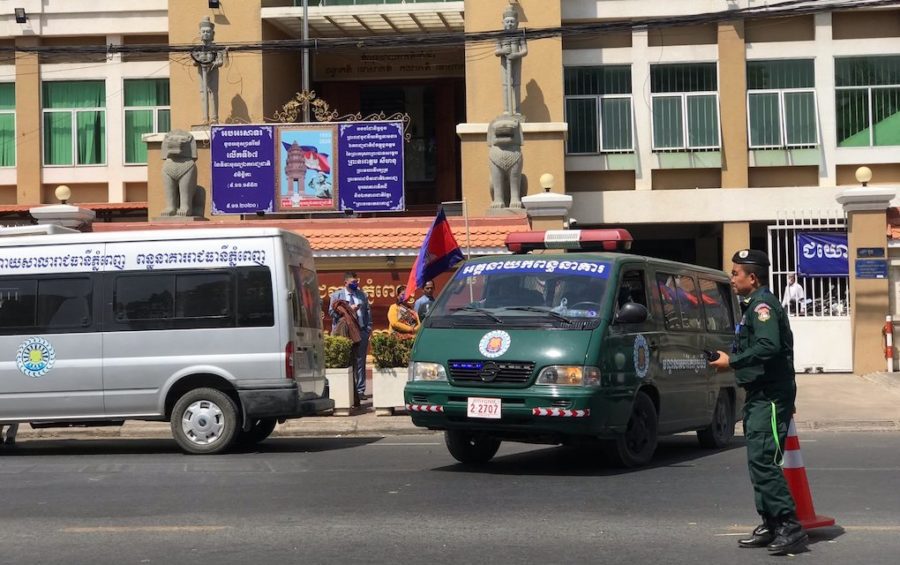Tapped private phone conversations were debated in court on Thursday as evidence of former opposition party members organizing a plan to topple the government, in the latest hearing in a series of ongoing trials against the outlawed CNRP.
Separately, the Phnom Penh Municipal Court on Thursday rejected a request to restart the treason trial against CNRP president Kem Sokha.
Twenty-one defendants were on trial for plotting, inciting military personnel to disobey orders and incitement to disturb social security, with three teachers questioned on Thursday during the two-hour morning hearing.
Keo Thay, who worked as a teacher for more than 30 years and was also the chief of the CNRP’s executive committee in Kampong Chhnang province, said that after his arrest 10 months ago he had been questioned by an investigating judge about private phone conversations from 2019.
“I just talked generally, just chitchat as villagers,” Thay said. He questioned how joking among close friends had turned into an incitement charge.
He said he didn’t remember exactly what was said, but he never said anything to provoke people into overthrowing the government.
As Thay questioned the evidence against him, Presiding Judge Ros Piseth said judicial police always follow legal procedures, and they have the right to listen in on phone conversations if there is a tip and a court order.
“For individuals for whom there is a lead, their phone needs to be tapped. The court has allowed them to do so,” Piseth said.
Another teacher, Piet Mab, who was also the party’s executive committee deputy chief in Siem Reap province, was questioned over phone conversations, including with a local man, Suy Bunthoeun. The prosecution said they had talked about the business interests of Prime Minister Hun Sen’s family.
Mab said he could not remember if he had called Bunthoeun or if Bunthoeun had called him. But Bunthoeun had done most of the talking, Mab said.
He added that they were within their rights to have a conversation.
“It was just normal talk and not related to any movement,” Mab said.
Judge Piseth, however, pressed Mab about the conversation, saying it contained falsehoods.
“Do you think that is freedom or what?” Piseth said. “You are a teacher. If you say something wrong, it makes others wrongly understand for many generations. Do you think that is self-expression or a kind of denunciation?”
Mab argued that a tapped private conversation would not amount to incitement.
“It was my understanding. I just wanted to know information and did not disseminate it. I just wanted to know information among two people,” he said. “It could not have been incitement.”
Mab was among four teachers controversially fired in Siem Reap in 2018 in the lead-up to that year’s national election. The ruling CPP swept every seat in the National Assembly that year, after the CNRP was controversially dissolved in 2017.
A third defendant, Sun Thun, declined to answer most questions on Thursday, citing health issues.
Adhoc spokesman Soeng Senkaruna, who monitored the trial hearing, said he was concerned about the liberal use of phone taps of arrested opposition members, as there were many others who could potentially be under threat.
“If any conversation is not related to an offense, [the court] should not take action against them,” Senkaruna said.
The trial — one of four against a total of about 150 CNRP leaders and supporters — is scheduled to continue on March 18.
Meanwhile, in a letter issued Thursday, Presiding Judge Koy Sao said the trial against CNRP president Sokha still cannot be restarted due to Covid-19 concerns, again noting that the courts were prioritizing cases with defendants detained in the country’s overcrowded prisons.
Sokha was arrested in September 2017 and is currently on bail and remains under court supervision.
Additional reporting by Khan Leakhena












